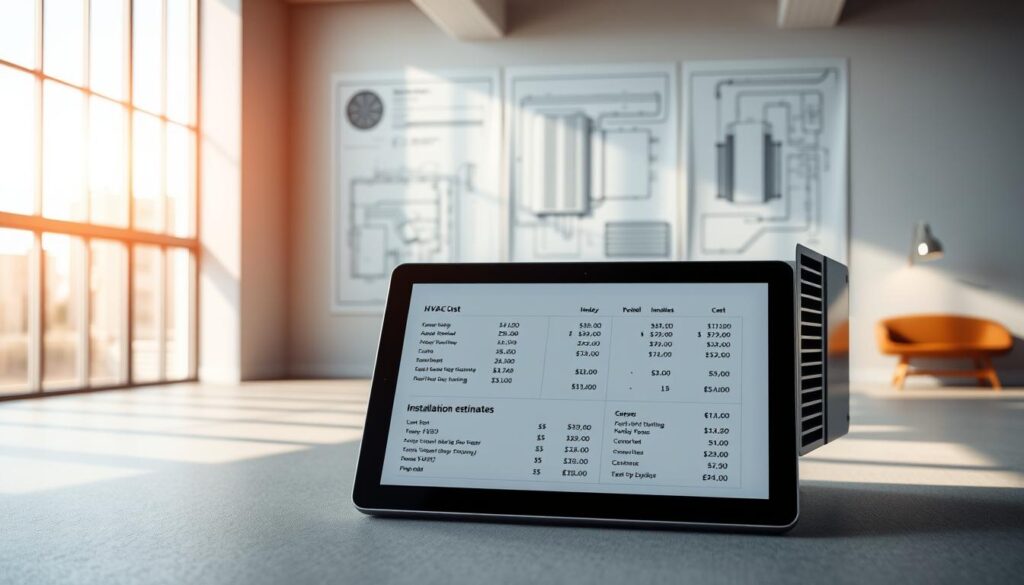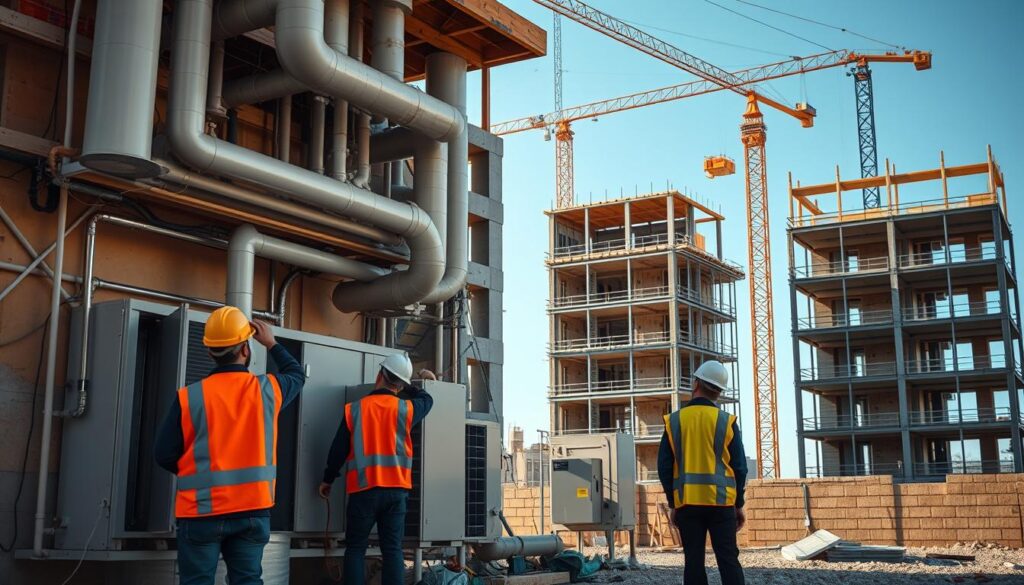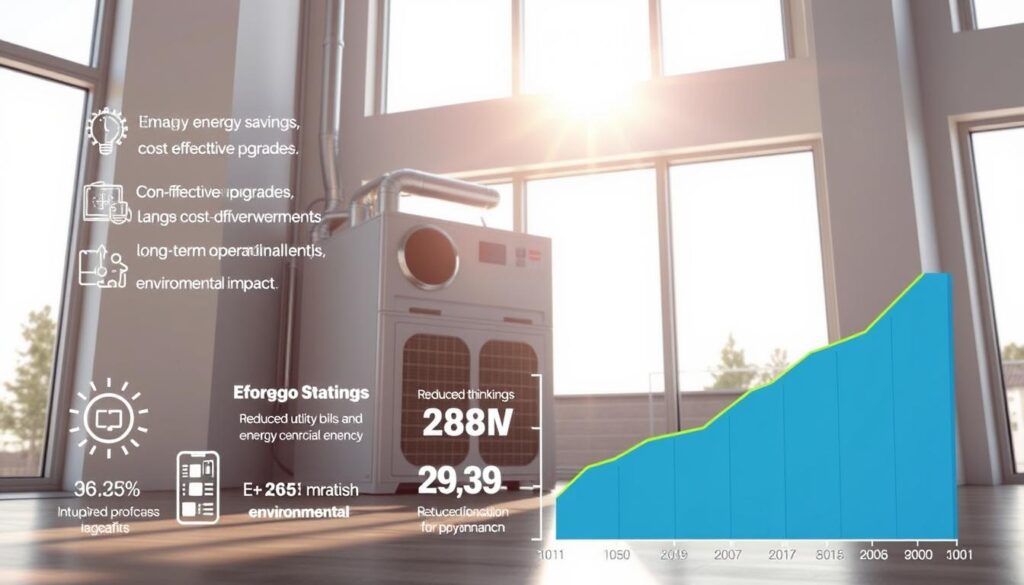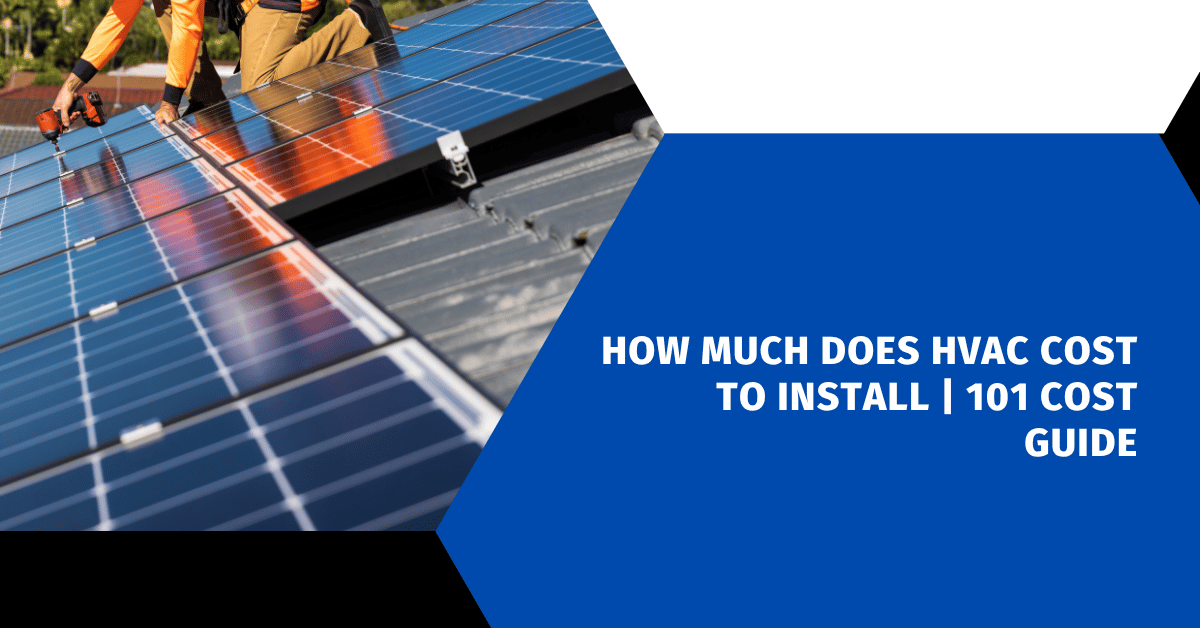Affiliate Disclosure
HVAC Guide Guys is a participant in the Amazon Services LLC Associates Program, an affiliate advertising program designed to provide a means for sites to earn advertising fees by advertising and linking to Amazon.
How Much Does HVAC Cost to Install? Ever wondered why HVAC installation costs seem so mysterious? It’s more than just a simple expense for homeowners. The real cost of a new heating and cooling system is complex.

When you think about HVAC installation cost, it’s a big investment. It usually falls between $5,000 and $12,500. The price varies based on your home’s size, the type of system, and energy efficiency needs.
This guide will cover everything you need to know about HVAC installation costs. We’ll break down system types and discuss pricing factors. Our goal is to help you choose the right system for your budget and comfort.
Key Takeaways
- Average HVAC installation costs range between $5,000 and $12,500
- Multiple factors influence the total installation price
- Home size and system complexity impact overall expenses
- Energy efficiency can affect both upfront and long-term costs
- Professional assessment is key for accurate pricing
Table of Contents
Overview of HVAC Installation Costs
Understanding the cost of a new HVAC system can feel overwhelming for homeowners. The average price for HVAC replacement varies widely. This depends on many factors. Your total investment will depend on your home’s unique characteristics and specific requirements.
When calculating the cost of a new HVAC system, several key elements come into play. These critical factors determine your total investment:
- Home square footage
- Local climate conditions
- System complexity
- Energy efficiency ratings
- Existing ductwork infrastructure
Average Cost Ranges for Different Home Sizes
Your home’s size directly impacts HVAC installation expenses. Smaller homes typically require less expensive systems, while larger spaces demand more powerful equipment. Here’s a general breakdown:
- Small homes (up to 1,000 sq ft): $2,500 – $5,000
- Medium homes (1,000-1,500 sq ft): $5,000 – $7,500
- Large homes (1,500-2,500 sq ft): $7,500 – $12,000
National Price Averages and Regional Variations
The average price for HVAC replacement can fluctuate significantly based on your geographic location. Coastal and extreme climate regions often experience higher installation costs due to specialized equipment requirements.
Understanding Basic HVAC Components
A standard HVAC system includes several core components that contribute to the overall cost of new HVAC system installation:
- Outdoor condensing unit
- Indoor air handler
- Ductwork
- Thermostat
- Refrigerant lines
By understanding these elements, you can make more informed decisions about your HVAC investment and long-term savings.
Explore Our HVAC Shop
Looking for top-rated HVAC tools, parts, and accessories? Visit our shop and find the perfect solution for your needs.
Visit the ShopTypes of HVAC Systems and Their Costs
Choosing the right HVAC system for your home means knowing the different types and their prices. Each system has its own benefits and costs. These can affect your budget and how comfortable your home is.
Today, homeowners have many HVAC system options. Each has its own features and price tags.
Central Air Conditioning Systems
Central air conditioning is a top pick for cooling your whole home. Costs range from $3,900 to $7,900, based on your home’s size and needs.
- Provides consistent cooling throughout the entire home
- Requires existing ductwork or significant installation investment
- Energy efficiency ratings can significantly impact long-term costs
Heat Pump Systems
Heat pumps are great for both heating and cooling. They cost between $4,200 and $8,000. They work well in moderate climates, moving heat instead of making it.
- Dual functionality for heating and cooling
- Lower operational costs compared to traditional systems
- Environmentally friendly cooling and heating option
Furnace Systems
Furnace systems are a classic heating choice. Costs vary from $1,700 to $10,000. The price depends on the system’s size, efficiency, and fuel type.
- Gas, electric, and oil furnace options available
- Suitable for colder climate regions
- Different efficiency levels impact long-term energy expenses
When looking at HVAC prices, think about your home’s needs, local climate, and budget. This will help you make the best choice.
How Much Does HVAC Cost to Install in Different Home Types
Your home’s unique features greatly affect the cost of HVAC installation. Each home type needs a specific HVAC solution. This directly influences the overall cost.
Residential properties have varying HVAC needs. The size, layout, and current setup all play a part in costs. Let’s look at how different homes impact your HVAC investment:
- Single-Family Homes: Usually need the most detailed HVAC systems
- Installation costs range from $5,000 to $12,000 on average
- The size of the home affects the system’s size and price
- Apartments and Condos: Often have smaller HVAC needs
- Smaller spaces lead to lower installation costs
- Costs usually fall between $3,000 and $7,000
- Multi-Story Buildings: Face unique installation challenges
- More complex ductwork raises installation costs
- May need multiple units or zone-specific systems
Several factors can change your HVAC installation costs:
- Total square footage
- Number of floors
- Existing ductwork
- Home insulation quality
- Local climate conditions
Keep in mind, these are general guidelines. Each home is different. A professional HVAC assessment will give you the most accurate estimate for your home.
Pro Tip: Always get multiple quotes and consider long-term energy efficiency when calculating your total HVAC investment.
Explore Our HVAC Shop
Looking for top-rated HVAC tools, parts, and accessories? Visit our shop and find the perfect solution for your needs.
Visit the ShopMajor Factors Affecting HVAC Installation Prices
Understanding the cost factors for HVAC installation is key to making smart choices for your home’s comfort. Many elements affect the total cost, making each installation unique to your home’s needs.
Your home’s features greatly influence HVAC installation costs. Several important factors directly affect the cost of your new heating and cooling system.
Home Size and Layout Considerations
The size of your home is a big factor in HVAC installation costs. Bigger homes need more powerful systems, which means higher costs. The layout of your home can also make installation more complex, adding to labor costs.
- Smaller homes (under 1,000 sq ft) typically need less expensive systems
- Multi-story homes might require multiple units or complex ductwork
- Open floor plans can impact system efficiency and sizing
Energy Efficiency Ratings Impact
Energy efficiency ratings have a big impact on both the initial cost and long-term savings. Systems with higher ratings might cost more upfront but save you money on bills over time.
- SEER ratings determine system efficiency
- Higher efficiency units often qualify for tax credits
- Long-term energy savings can offset initial investment
Installation Complexity Factors
The complexity of your HVAC installation can greatly affect costs. Unique architectural features, existing ductwork, and home accessibility all play important roles in determining the final cost.
Professional assessments can help you understand your specific installation challenges and possible cost variations.
By carefully considering these factors, you can make informed decisions. This balances immediate costs with long-term performance and efficiency.
Brand Comparison and Equipment Costs
When you’re looking at a new HVAC system, knowing about different brands and costs is key. The cost to install an HVAC system changes a lot between brands. You’ll find everything from affordable to high-end options.
Top HVAC makers have different prices based on their quality and what they offer. The cost of a new HVAC system depends on a few important things:
- Brand reputation
- System complexity
- Energy efficiency ratings
- Warranty coverage
Now, let’s look at some well-known HVAC brands and their usual price ranges:
| Brand | Price Range | Key Features |
|---|---|---|
| Carrier | $4,500 – $8,000 | High efficiency, reliable performance |
| Trane | $5,000 – $9,000 | Advanced technology, durability |
| Lennox | $4,800 – $7,500 | Superior energy efficiency |
| Rheem | $3,500 – $6,500 | Cost-effective, solid warranty |
Pro tip: Don’t just look at the initial cost. Think about long-term savings and reliability too. A pricier brand might save you money over time with better efficiency and fewer repairs.
Your specific HVAC installation cost will vary based on your home’s needs. It’s important to get quotes from several companies. Compare not just prices, but the overall value you get.
Explore Our HVAC Shop
Looking for top-rated HVAC tools, parts, and accessories? Visit our shop and find the perfect solution for your needs.
Visit the ShopLabor Costs and Installation Requirements
Installing an HVAC system is more than buying equipment. It includes important labor costs that affect the total cost and how well the system works.

Professional technicians are key to a good HVAC setup. The cost of installation varies, with different service packages available. These packages aim to ensure the system is installed correctly.
Professional Installation Fees
Skilled HVAC technicians charge differently based on the job’s complexity:
- Standard residential installations: $75-$150 per hour
- Complex system setups: Potentially higher hourly rates
- Full-day installation projects: Flat rate options available
Permit and Inspection Requirements
| Permit Type | Average Cost | Purpose |
|---|---|---|
| Mechanical Permit | $250-$500 | Ensures code compliance |
| Electrical Permit | $100-$300 | Verifies electrical system safety |
Additional Labor Considerations
Your total installation expenses might include:
- Ductwork modifications
- Electrical system upgrades
- Old system removal and disposal
- Site preparation
Choosing professional installation can save you money in the long run. It ensures your HVAC system works well, reducing repair and energy costs.
Ductwork and Additional Components
When you’re looking at HVAC unit installation prices, ductwork is key. It’s the network that spreads heated and cooled air around your home.
New ductwork can change your hvac replacement estimates a lot. The cost depends on your home’s design and current setup:
- Base duct repairs: $500 to $1,000
- Partial duct section replacements: $1,500 to $5,000
- Complete home duct installation: $7,000 to $15,000
Your HVAC system works best with good ductwork. Bad ducts waste energy and raise your bills. HVAC pros say to check your ducts before installing to spot problems.
| Ductwork Component | Estimated Cost Range | Installation Complexity |
|---|---|---|
| Duct Sealing | $500 – $1,500 | Low |
| Duct Replacement | $1,500 – $5,000 | Medium |
| Full Duct System Installation | $7,000 – $15,000 | High |
Things like thermostats, air purifiers, and humidity controllers can make your HVAC better. They cost more upfront but can make your air cleaner and your system more efficient.
Energy Efficiency and Long-term Cost Savings
When you think about the cost of installing an HVAC system, it’s important to look at the long-term savings. Energy-efficient HVAC systems can save you money over time. This can help pay off the initial cost of installation.

Choosing a high-performance HVAC system changes how much energy your home uses. It also lowers the cost of installing an HVAC system. Modern systems can save you a lot of money on your utility bills.
SEER Ratings Explained
Seasonal Energy Efficiency Ratio (SEER) shows how well an air conditioner cools. A higher SEER rating means:
- Less energy used
- Lower electricity bills
- Better for the environment
Annual Energy Savings
New HVAC units can cut your energy bills by 20-40%. Even though they might cost more upfront, they save you a lot of money in the long run.
| Efficiency Level | Annual Savings | Initial Cost Difference |
|---|---|---|
| Standard Efficiency | $200 | $500 |
| High Efficiency | $600 | $2,000 |
Return on Investment Timeline
Most homeowners see their money back in 5-7 years. This is thanks to lower utility bills and less maintenance. Choosing the right HVAC system is a smart financial move.
Financing Options and Payment Plans
Getting a new HVAC system can cost a lot for homeowners. Knowing your financing options can make it easier to handle the cost. There are many ways to make paying for a new HVAC system more manageable.
Here are some financing strategies to consider:
- Personal Loans: Unsecured loans from banks or credit unions with fixed interest rates
- Home Equity Loans: Borrow against your home’s equity with potentially lower interest rates
- Manufacturer Financing: Direct payment plans offered by HVAC equipment manufacturers
- Credit Card Promotions: Zero-interest periods for qualified buyers
When picking a financing method, think about these important factors:
- Your current credit score
- Available interest rates
- Repayment term flexibility
- Potential tax credits or rebates
Many utility companies and government programs offer incentives. These can lower your hvac installation cost. Look into local and federal energy efficiency programs for savings. Some programs give tax credits up to 30% of your system’s cost, which can greatly reduce the cost of a new HVAC system.
Pro tip: Always compare multiple financing options and read the fine print before committing to a payment plan.
Conclusion
Figuring out how much HVAC costs can be tough. A new system usually costs between $5,000 to $12,500 for most homeowners. This is a big investment, but the right system can make your home more comfortable and energy-efficient.
Think of HVAC installation as a smart home upgrade, not just a cost. The right system can cut down your energy bills, boost your home’s value, and keep your home comfy. Getting quotes from different pros will help you choose wisely, balancing upfront costs with long-term gains.
When looking at HVAC options, don’t just look at the price. Think about energy efficiency, how long it lasts, and how much you’ll save each year. HVAC experts can give you a detailed plan for your home, making sure you get the best system for your needs.
Buying a good HVAC system is more than a purchase. It’s a promise to your home’s comfort and efficiency. By understanding what affects costs, you can make a smart choice for your home.
FAQ
What is the average cost of HVAC installation?
How much does an HVAC system cost for different home sizes?
What factors most significantly impact HVAC installation costs?
How long does a typical HVAC system last?
Are there any ways to reduce HVAC installation costs?
What is the most cost-effective HVAC system type?
Do I need to replace ductwork during HVAC installation?
What is the average cost of HVAC installation?
How much does an HVAC system cost for different home sizes?
What factors most significantly impact HVAC installation costs?
How long does a typical HVAC system last?
Are there any ways to reduce HVAC installation costs?
What is the most cost-effective HVAC system type?
Do I need to replace ductwork during HVAC installation?
FAQ
What is the average cost of HVAC installation?
HVAC installation costs range from ,000 to ,000. This depends on your home’s size, the type of system, and local prices. The cost can change based on your home’s size, the system’s efficiency, and how complex the installation is.
How much does an HVAC system cost for different home sizes?
For a 1,000 square foot home, expect to pay ,000-,000. Homes between 2,000-2,500 square feet might cost ,000-,000. Homes over 3,000 square feet could cost ,000-,000.
What factors most significantly impact HVAC installation costs?
Key factors include your home’s size, the system type, and energy efficiency. The condition of your ductwork, local labor rates, and installation complexity also matter. Brand, climate, and home layout can affect the cost too.
How long does a typical HVAC system last?
HVAC systems usually last 10-15 years with regular care. High-efficiency systems from top brands can last up to 20 years with proper maintenance.
Are there any ways to reduce HVAC installation costs?
Yes, you can save money by getting quotes from different companies. Installing during off-peak seasons can also help. Choosing mid-range systems and ensuring good insulation are smart choices. Look for rebates or tax credits from manufacturers.
What is the most cost-effective HVAC system type?
Heat pumps are often the most cost-effective. They provide both heating and cooling. They have lower upfront costs and can save a lot on energy compared to separate systems.
Do I need to replace ductwork during HVAC installation?
You might need to replace ductwork if it’s over 15 years old or damaged. This can add
FAQ
What is the average cost of HVAC installation?
HVAC installation costs range from $5,000 to $12,000. This depends on your home’s size, the type of system, and local prices. The cost can change based on your home’s size, the system’s efficiency, and how complex the installation is.
How much does an HVAC system cost for different home sizes?
For a 1,000 square foot home, expect to pay $5,000-$7,000. Homes between 2,000-2,500 square feet might cost $7,000-$10,000. Homes over 3,000 square feet could cost $10,000-$15,000.
What factors most significantly impact HVAC installation costs?
Key factors include your home’s size, the system type, and energy efficiency. The condition of your ductwork, local labor rates, and installation complexity also matter. Brand, climate, and home layout can affect the cost too.
How long does a typical HVAC system last?
HVAC systems usually last 10-15 years with regular care. High-efficiency systems from top brands can last up to 20 years with proper maintenance.
Are there any ways to reduce HVAC installation costs?
Yes, you can save money by getting quotes from different companies. Installing during off-peak seasons can also help. Choosing mid-range systems and ensuring good insulation are smart choices. Look for rebates or tax credits from manufacturers.
What is the most cost-effective HVAC system type?
Heat pumps are often the most cost-effective. They provide both heating and cooling. They have lower upfront costs and can save a lot on energy compared to separate systems.
Do I need to replace ductwork during HVAC installation?
You might need to replace ductwork if it’s over 15 years old or damaged. This can add $1,500-$5,000 to the cost.
How much do energy-efficient HVAC systems cost?
Energy-efficient systems with high SEER ratings cost 20-30% more upfront. They can save 20-40% on energy costs. Prices range from $6,000-$15,000, depending on your home’s needs.
What financing options are available for HVAC installation?
Financing options include manufacturer programs, personal loans, home equity loans, and credit card deals. Many companies offer 0% interest for 12-24 months. Some utility companies also offer rebates for energy-efficient systems.
How long does HVAC installation typically take?
Installation usually takes 1-3 days, depending on the system and home size. Larger homes or complex installations might take up to 5 days.
,500-,000 to the cost.
How much do energy-efficient HVAC systems cost?
Energy-efficient systems with high SEER ratings cost 20-30% more upfront. They can save 20-40% on energy costs. Prices range from ,000-,000, depending on your home’s needs.
What financing options are available for HVAC installation?
Financing options include manufacturer programs, personal loans, home equity loans, and credit card deals. Many companies offer 0% interest for 12-24 months. Some utility companies also offer rebates for energy-efficient systems.
How long does HVAC installation typically take?
Installation usually takes 1-3 days, depending on the system and home size. Larger homes or complex installations might take up to 5 days.

